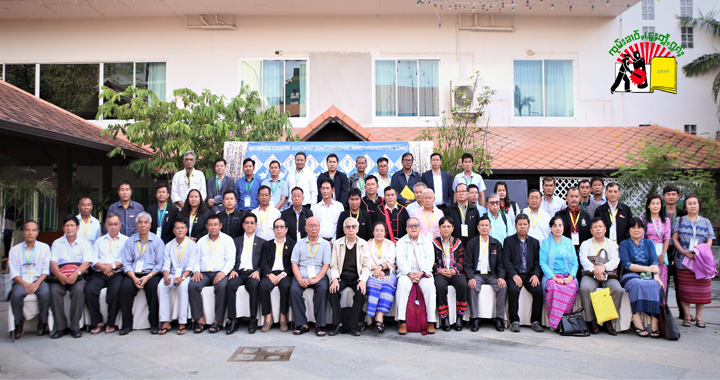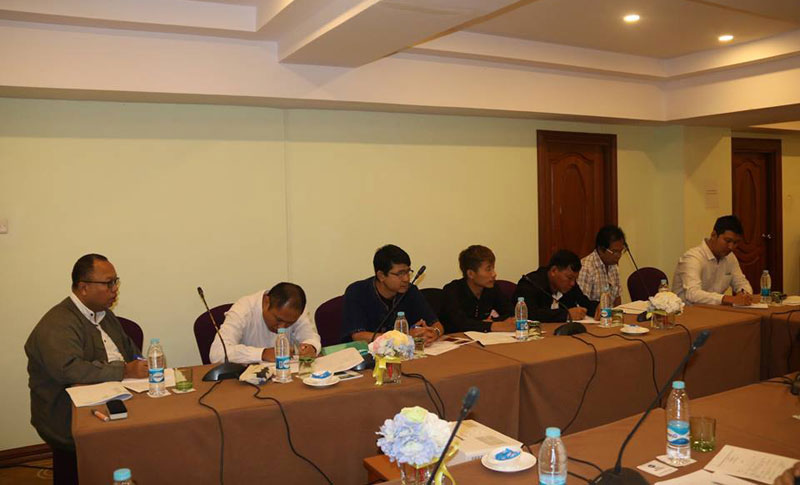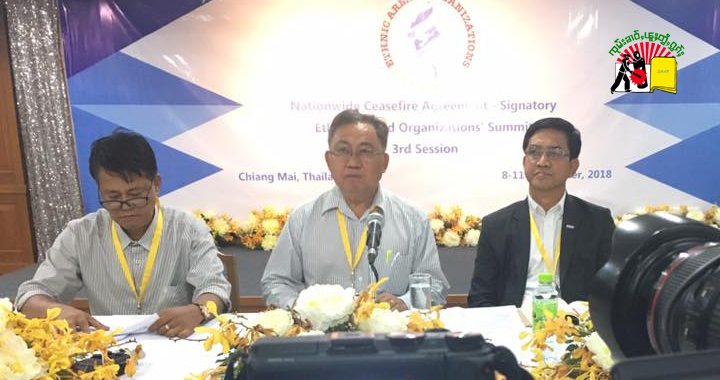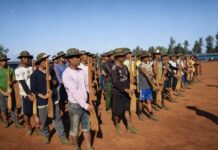The disagreement on whether to attend the Popa meeting, first initiated by the Nationwide Ceasefire Agreement-Signatory-Ethnic Armed Organizations (NCA-S-EAO) but later fervently pushed by the government-military regime, was resolved when Restoration Council of Shan State (RCSS) boss and Vice-Chair of the EAOs meeting, which was held from 10-11 October in Chaing Mai, intervened by proposing two conditions.

One is not to discuss the so-called package deals – EAOs acceptance of non-secession in exchange for allowance to draft state constitution demanded by the military or Tatmadaw, which the EAOs have yet to reach a common position among themselves, and other is to change the venue from Popa to Yangon or Naypyitaw
The meeting agreed to the proposal and when they talked to the Minister for the Office of the State Counselor Kyaw Tint Swe, he said it is alright with the Naypyitaw but would be difficult to arrange the logistics in Yangon in such a short time. Thus, Napyitaw is set to be the gathering venue.
Following the meeting in Chiang Mai, the signatory EAOs released a two-point statement mentioning the successfully held NCA-S-EAO meeting in Chaing Mai and agreement of their top leaders meeting with the government, scheduled to take place in Naypyitaw on October 15.
Accordingly, a five-point decision was agreed upon at the end of the Chiang Mai meeting.
The gist of it is as follows:
- Regarding the planned informal meeting of October 15 in Naypyitaw:
(a) Agrees to hold meeting on October 15
(b) Agrees to hold meeting at Naypyitaw
(c) Non-secession not a fundamental issue for the establishment of a federal union system
(d) NCA-S-EAO will not discuss “one army” issue
(e) Meeting agenda to be
(1) Timeline and sequencing of the remaining 3 21CPC – once in 2018 and twice in 2019.
(2) To overcome package deal demanded by the Tatmadaw
(3) Framework review to simplify and make it easy
(4) Agreement on top-down decision-making
(5) All-inclusiveness of all EAOs
(6) To solidify ceasefire agreement
(f) List of informal meeting participants; including 10 top leaders a delegation of 73 to 75 persons
- Formation of the preparatory committee of 10 persons for informal top leaders meeting
- Formation of 6-person committee to work for all EAO meeting which includes United Nationalities Federal Council (UNFC) and Federal Political Negotiation Consultative Committee (FPNCC)
- All EAO meeting slated for November 12 to 17
- Holding of Peace Process Steering Team (PPST-03/2018) meeting to be discussed further at Naypyitaw.

At the closing ceremony Gen Yawd Serk, Vice-Chairman of the meeting emphasized the historical lesson to be learned from the 1947 Panglong Agreement, including the 1961 federal amendment proposal spearheaded by the then Shan State government; to take into account that NCA being endorsed by the Parliament that stems from the 2008 Constitution; the need to have detailed opinion of 2008 Constitutional amendment and the common position on type of federal union the EAOs wanted to see.
He also further emphasized the meaning of security issue to be defined as human security where all socioeconomic aspects have to be involved, stressing the protection of people’s lives and properties are guaranteed and also upholding the pillar of media freedom.
He particularly reminded the EAOs to be careful of being coaxed into submission through various incentives that could deviate from their original political aspirations and give way to the personal or group survival. He added that if it happens, the common goal of the EAOs will be lost and in the end nobody will benefit.
It is clear that all the stakeholders will be in to cash in for some political profit, one way of the other.
For the quasi-civilian-military government a degree of positive political development is duly needed to show the domestic audience and international community to lessen the UN and international condemnation pressures, which are gearing up to drag the country’s military top brass to face charges under the rubric of International Criminal Court (ICC), regarding the Rakhine Rohingya crisis.

Other than that, the EU is now even considering to impose economic sanctions to punish the country for what it considers to be the crime against humanity. And with the downturn of the country’s economy under the NLD government, this could have a tremendous effect.
The EAOs, on their part, also have to up the ante by sending message to the government, especially the Tatmadaw, that heavy-handedness isn’t going to work in peace process negotiation. Precisely, they are determined not to accept the Tatmadaw’s demand of so-called package deals. In all, they are likely to make it clear that a more equal-footing negotiation atmosphere is needed and it is key to end the stagnation of the peace process, so that earnest business of peace talks could begin.
As such, all contending parties would be well advised to put the benefit of the country and people ahead of furthering their political agenda, so that all could climb out of this pit hole of civil war, human tragedy and misery.











Leave a Comments